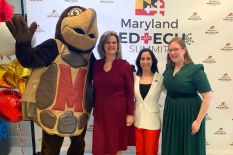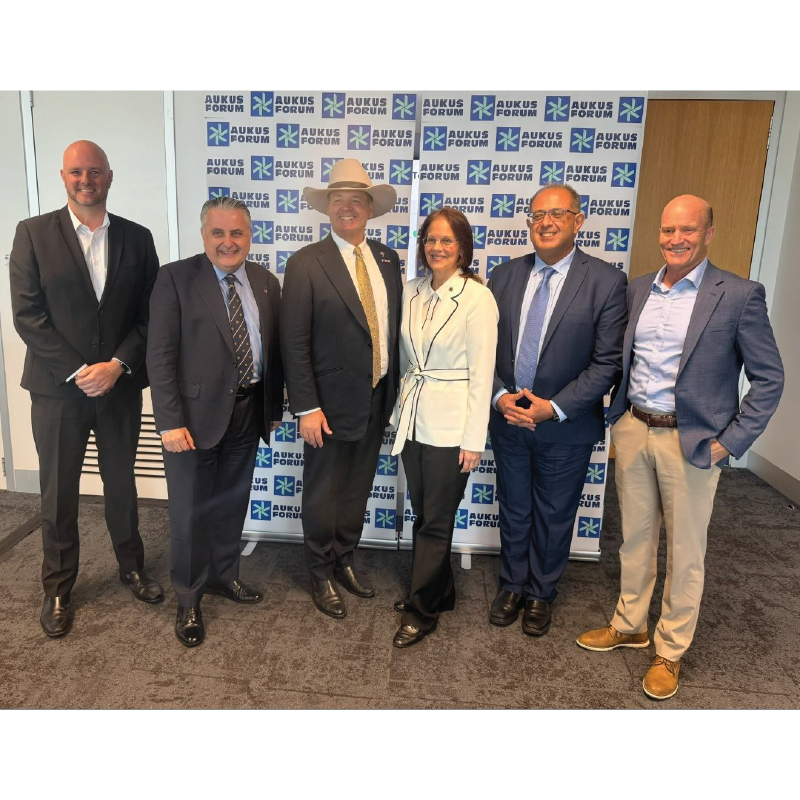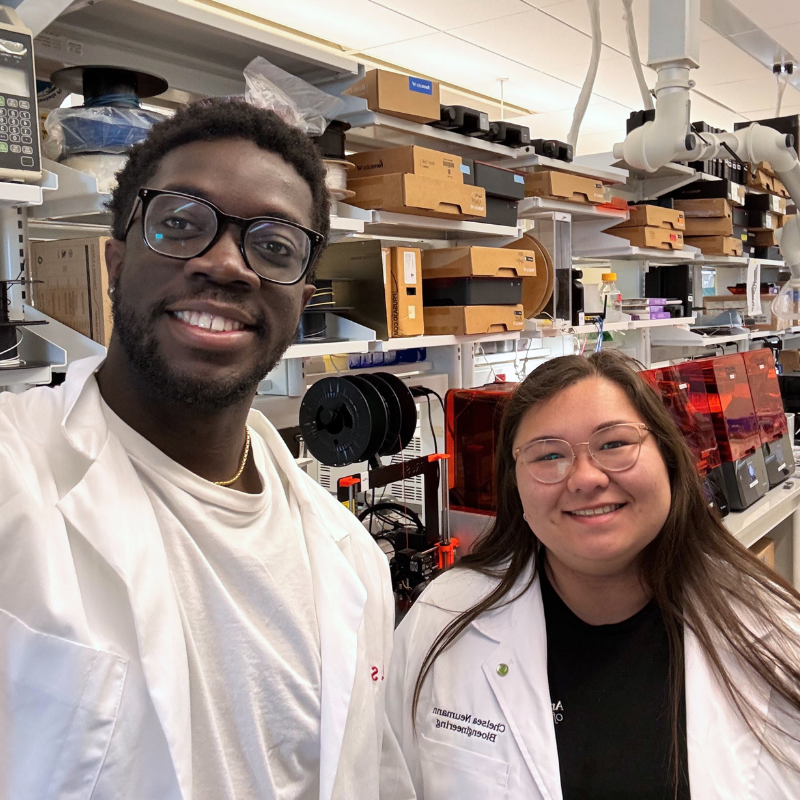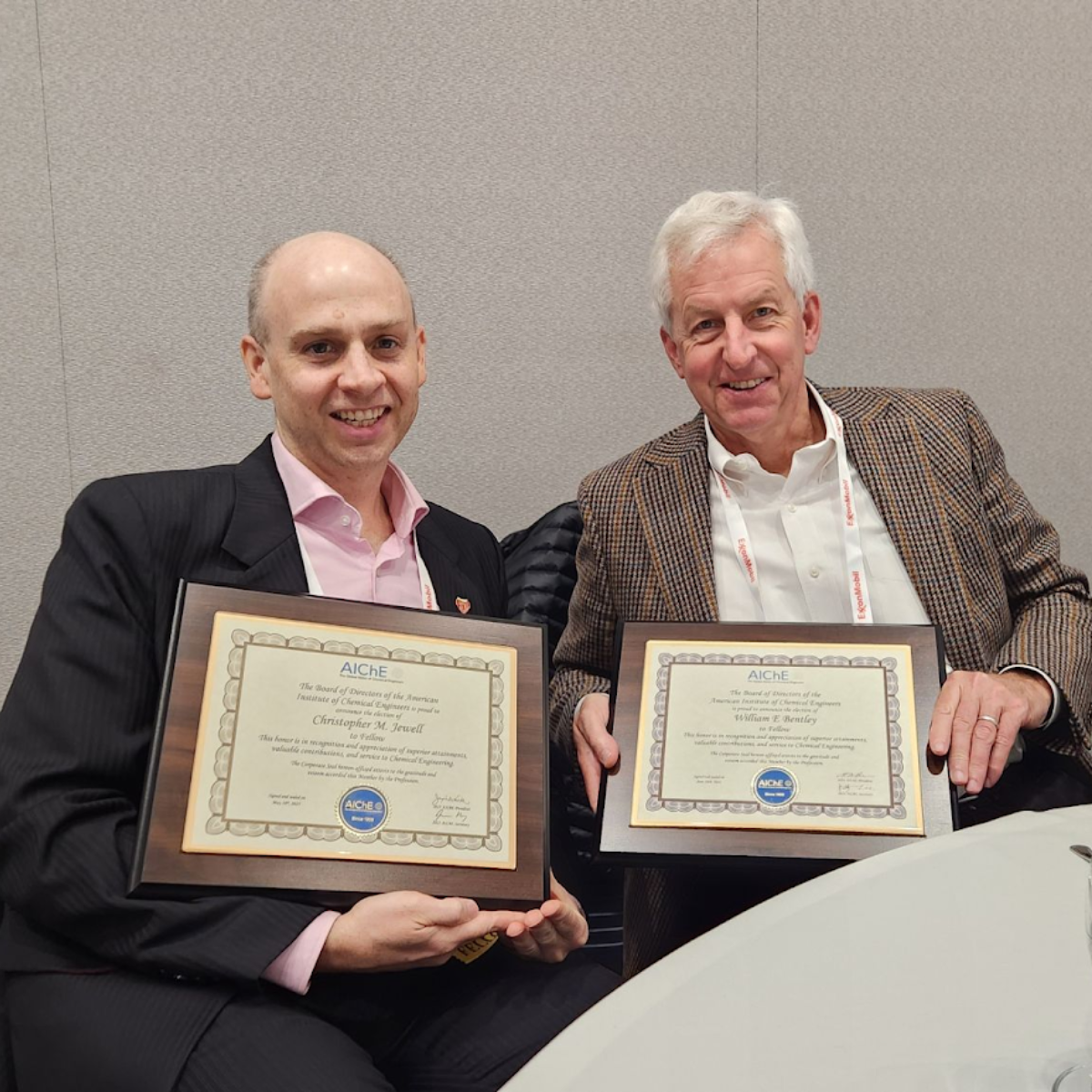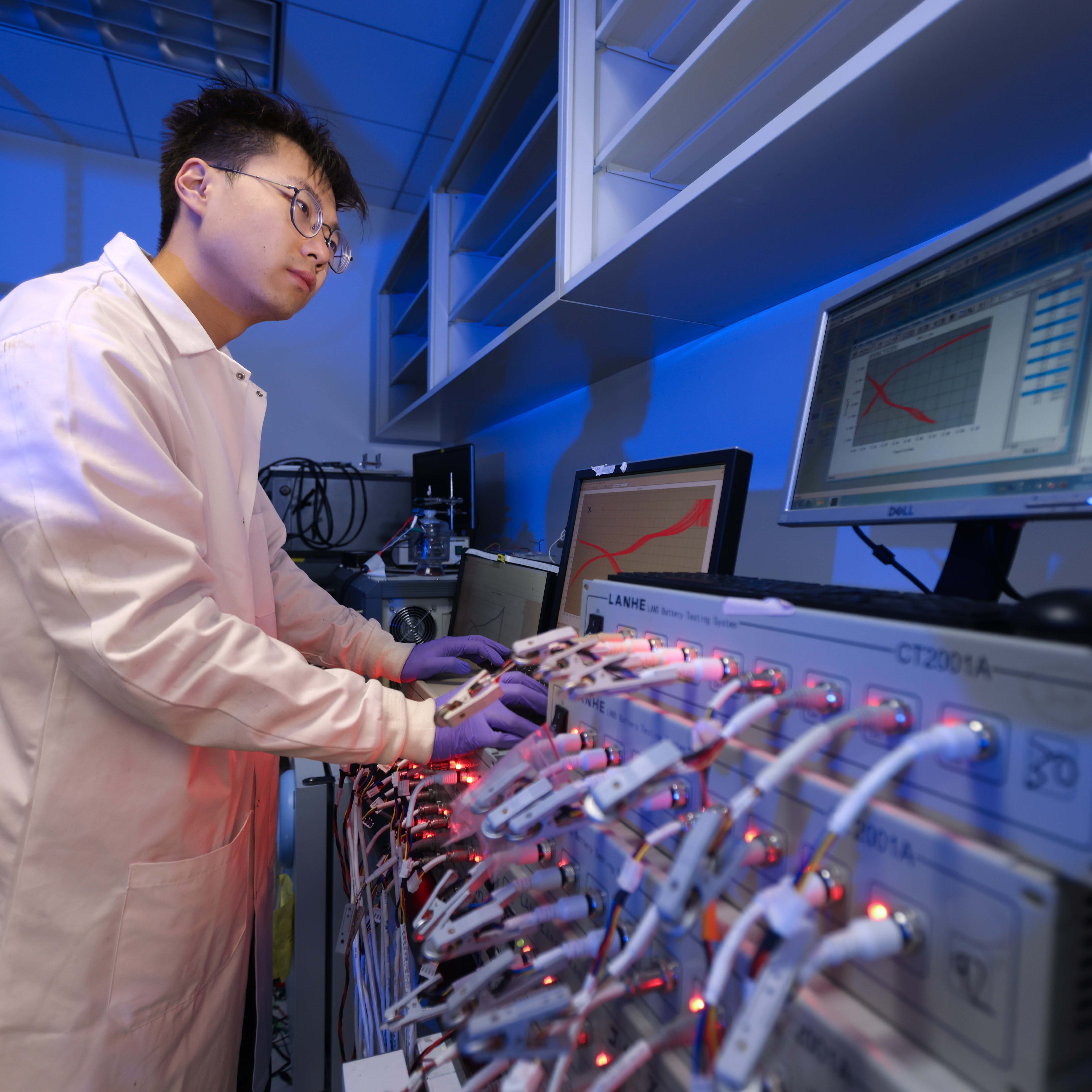News Story
Fischell Institute, Department of Commerce Host First Annual Maryland MedTech Summit
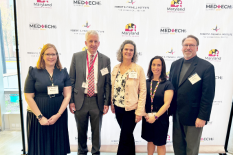
The Robert E. Fischell Institute for Biomedical Devices and the Maryland Department of Commerce teamed up to host the first annual Maryland MedTech Summit on April 11, 2024, at the University of Maryland.
The event drew more than 160 people, including medical device innovators, investors, universities, the U.S. Food and Drug Administration, National Institute of Standards and Technology, National Institutes of Health, additional government agencies, and more, to celebrate and build on Maryland’s growing medtech industry.
More than 50 speakers participated in ten panels, as well as a quick pitch session for medtech startups.
“It was great to convene an event that was specifically dedicated to our medtech ecosystem, where our challenges of equitable health delivery, product adoption, revenue modeling, engineering capabilities, and the manufacturing of physical products are unique,” said Bob Storey, vice chairman, Maryland Life Sciences Advisory Board and managing partner, LaunchPort, LLC. “Two of our major goals as a state are to build a flourishing and experienced pool of talent in getting products to the bedside, and increase the opportunities for our workforce to participate in middle-class growth via hard-tech manufacturing. The medtech sector needs to play a large role in achieving those objectives, and I’m looking forward to building on the momentum that this summit provided.”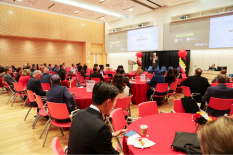
Opening remarks were presented by William Bentley, Robert E. Fischell Distinguished Chair and inaugural director of the Robert E. Fischell Institute for Biomedical Devices, Fischell Department of Bioengineering, University of Maryland, and Stefanie Trop, director, Office of Life Sciences, Department of Commerce.
The first morning panel was “Engineering the Future: Trends in MedTech,” moderated by Storey. Panelists included: William Bentley; Youseph Yazdi, faculty and director, Johns Hopkins Center for Bioengineering Innovation & Design (CBID); Henry Brem, professor and director of neurosurgery, Johns Hopkins University; Kyp Sirinakis, co-founder and managing partner, Epidarex Capital; and George Davis, executive vice president, strategic advisory practice, Evergreen Advisors.
A panel titled “Health Equity in Focus: Driving Social Change Through MedTech” followed, moderated by Troy LeMaile-Stovall, CEO of TEDCO. Panelists included: Kolaleh Eskandanian, vice president and chief innovation officer, Children's National Hospital; Kristen Valdes, CEO, b.well Connected Health; and Katrina Holland, executive director, MedTech Color.
The third morning panel was “Seizing Opportunities: National and Regional MedTech Initiatives,” moderated by John Sawyer, executive director, Mid-Atlantic Quantum Alliance and director, Strategic Research Initiatives, University of Maryland. Panelists included: Michael Wolfson, program director, National Institute of Biomedical Imaging and Bioengineering, National Institutes of Health (NIH); Amy Jenkins, mission office director, Advanced Research Projects Agency for Health (ARPA-H); Douglas Kelly, deputy director for science, Center for Devices and Radiological Health, Food and Drug Administration (FDA); Mike Pieck, director, Catalyze Program, National Heart, Lung, and Blood Institute, NIH; and Scott Shepard, senior policy advisor, NIST.
A “Collaboration Catalyst Quick Pitch” followed, moderated by Marjie Cota, director of entrepreneurial services at bwtech@UMBC. Companies presenting included: Hawkeye MedTech, Healytics, CarrTech, Djit Medtech, Korion Health, NeurTX, Sonogen Medical, Theradaptive, and Benekinetic.
A networking lunch ensued. 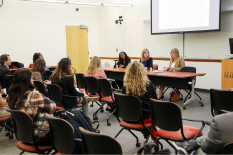
The first afternoon session was “Regulatory Science in Action: Developing Emerging Technologies Alongside the FDA,” moderated by Valerie Merkle, senior director, Medical & Scientific Affairs, Terumo Aortic. Panelists included: Ed Margerrison, director, Office of Science and Engineering, FDA; Bill Vogt, assistant director, Division of Biomedical Physics, FDA; and Frank Samuelson, Research Physicist, Office of Science and Engineering Laboratories, FDA.
Parallel panel sessions then followed. The first was “Navigating Maryland's MedTech Startup Ecosystem: Here's What Really Works,” moderated by Dean Chang, chief innovation officer and associate vice president for innovation & entrepreneurship and economic development, University of Maryland. Panelists included: Ric Hughen, CEO, Linshom Medical; Howard Carolon, co-founder and CEO, CoapTech; Ian White, associate chair and director of undergraduate studies, Fischell Department of Bioengineering, University of Maryland; and Xiaonao Liu, founder and CEO, NanoBioFAB.
The second was “Building Resilient MedTech Manufacturing: Opportunities for Onshoring and Strengthening Supply Chain,” moderated by Mike Kelleher, executive director, Maryland Manufacturing Extension Partnership (MEP). Panelists included: Ken Malone, founder and executive officer, Early Charm Ventures, LLC; Bob Storey; Chad Schneider, CEO and founder, Root3 Labs; and Cyrus Etemad-Moghadam, president and founder, Rapid Prototyping and Manufacturing Technologies, LLC (RPM Tech).
“I really enjoyed talking with this group about manufacturing resiliency,” said Schneider. “Of course, supply chain issues aren’t confined to the medtech industry, but with such a tightly controlled regulatory environment, there are some unique challenges. We talked about automation and robotics, modular manufacturing, workforce development, and more, but my key takeaway was optimism about the community of smart, collaborative people that are passionate about innovation and building things.”
The third was “Preparing for Tomorrow: Workforce Training Resources for Maryland's MedTech Industry,” moderated by Anne Balduzzi, managing director, Entrepreneur and Ecosystem Empowerment (E3), TEDCO. Panelists included: Jen Spencer Heilman, program director, MTIP/MIIC, University of Maryland Baltimore County; Chris Frew, founder, BioBuzz; Greg MIller, executive director, HealthTech Alley; and Drew Greenblatt, president and owner, Marlin Steel Wire Products, LLC.
A second set of parallel panels followed. The first was “Payment and Partnership Pathways: Navigating Reimbursement and Revenue Models,” moderated by Christina DeMur, director of technology development, Johns Hopkins Technology Ventures (JHTV). Panelists included: Ibraheem Badejo, senior R&D director, external front end innovation, Johnson & Johnson; Brad Rabinovitz, COO, Longeviti Neuro Solutions; Amber Fee, manager of data analytics, MITRE HFPP-TTP; and Sebastian Seiguer, CEO and co-founder, Scene Health.
The second parallel panel session was “Joining Forces: A Call to Action to Mobilize Local Stakeholders to Secure CHIPS Support for Microelectronics,” moderated by Pamela Abshire, professor, Department of Electrical and Computer Engineering, University of Maryland. Panelists included: Brian Jamieson, founder and CTO, Diagnostic Biochips; Scott Shepard, senior policy advisor, NIST; and Brian Darmody, chief strategy officer, Association of University Research Parks.
The third parallel session was “Attracting Investment: Taking Advantage of Maryland's Biotechnology Investment Incentive Tax Credit (BIITC),” moderated by Matt Cimino, manager, business and innovation development, Maryland Department of Commerce. Panelists included: Deborah Hemingway, founder and managing partner, Ecphora Capital; Samantha Scott, founder and CEO, JuneBrain; and Abigail McKnight, program manager, tax incentives, Maryland Department of Commerce.
Martha Wang, assistant director, Fischell Institute for Biomedical Devices, gave closing remarks.
The day ended with a networking happy hour.
"It was truly remarkable to attend such an energetic gathering of opinion leaders and movers and shakers in the medtech industry across the state,” said Hemingway. “The panel discussions were impressive, thanks to the high caliber of the guest speakers, and the company pitches were incredibly inspiring. My favorite part of the event, though, was the genuine connections and the strategic alliances that were formed. This inaugural conference was a phenomenal success, and I am eagerly looking forward to next year’s event."
The summit was organized by Trop, Bentley and Wang, with assistance from Storey and Mary Morris, director, Baltimore Fund, University of Maryland, Baltimore.
Event sponsors included: Maryland Department of Commerce, Amarex, TEDCO, AdvaMed, bwtech@UMBC, Duane Morris LLP, Greencourt Innovation Center, Henry M. Jackson Foundation for the Advancement of Military Medicine, Inc., Marlin Steel, Montgomery County Economic Development Corporation, Maryland Technology Enterprise Institute (Mtech), and Rockville Economic Development, Inc.
Student volunteers for the event included: Samantha Meyr (BIOE M.S.’24), Arsalan Siddiqui (BIOE M.S.’ 25), Vidhi Kaushik (BIOE M.S.’24), Monica Chu (BIOE Ph.D.’25), Philip Phillips (BIOE B.S.’24), Fiona Sheridan (BIOE B.S.’24), Jonathan Caohuy (BIOE B.S.’25), Jason Chen (Robotics M.S ’25), Jothika Saravanarajan (BIOE B.S.’27), Gatha Adhikari (BIOE Ph.D.’26), Michael Straker (BIOE Ph.D.’25), Taya Lee (BIOE Ph.D. ‘27), Jai Vaichalkar (BIOE B.S.’26), and Esha Chopra (BIOE B.S.’25).
"The inaugural Maryland MedTech Summit was a terrific collection of medical device experts from the region, from areas such as engineering, regulatory, quality, finance, funding and commercialization,” said Hughen. “Thanks to UMD and the Department of Commerce for organizing this great collection of talent."
Published April 19, 2024
